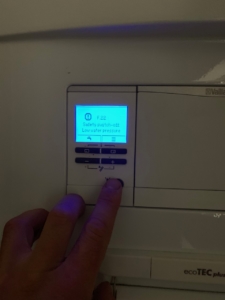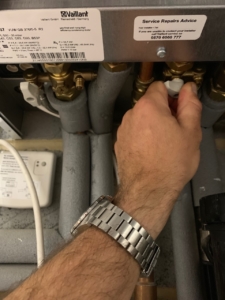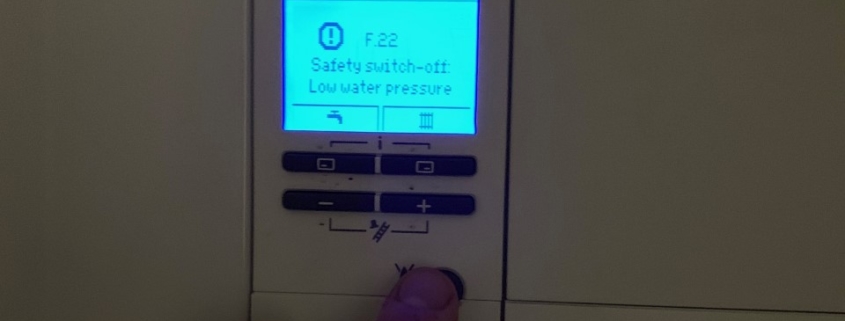Boiler pressure dropping! What are the causes of losing boiler pressure ?

Boiler pressure safety switch Vaillant Eco-tec.
Boiler pressure dropping. A guide to why your system pressure is dropping? Do not ignore this!
Boiler pressure dropping is something we encounter very frequently, especially during the heating season.
Central heating system which incorporate a pressure gauge and a filling loop are called sealed systems and should not lose pressure consistently.
Sealed system means exactly that!
Once all the air is bleed out of the heating system the pressure in the system should stay stable because the water has no where to go.
The central heating water circulates around the radiators and boiler every time you turn it on and unless you bleed a radiator or you have a leak the water has no way of escaping.
Boiler pressure dropping, what are the causes of system pressure lose?
The following steps will guide you through some basic steps to understand what is causing this drop.
If you cannot resolve this yourself using our guide below we are on hand to step in should you require some professional intervention.
1-You have a leak on your heating system!
You have a leak somewhere on the central heating circuit! This includes radiators, radiators valves and all connecting pipework.
Unfortunately this does sometimes mean pipework which is not visible, either underneath timber floors or screed.
Customer action! -Check all visible joints including radiator valves and connections for obvious signs of leaks. If you feel confident in doing so turn off the isolation valves for the heating circuit underneath the boiler as shown below. This will temporarily leave you without heating however this will prove whether your leak is on the heating circuit or boiler. If the pressure stays stable after shutting off the valves and you cannot find any obvious leaks then your leak is in the floor somewhere and you may require our assistance.
2-You have a faulty pressure relief valve!
You have a faulty pressure relief valve either inside the boiler or on an external pressure relief valve. Pressure relief valves are designed to let out excess pressure in the event of over pressure usually when the boiler exceeds 3 bar. When they fail they will leak water from the central heating system at a much lower pressure to a copper pipe terminated outside of the property.
Customer action!- Look externally for a small copper pipe exiting your property usually close to the boiler or cylinder location. This is the pressure relief pipe exiting to atmosphere.
You are looking to see if this is dripping while you have pressure in the system. If it is call us, this is not a DIY job.
3-You have a faulty expansion vessel
You have a faulty expansion vessel- This means your boiler pressure will exceed 3 bar during the heating up process.
This is because the expansion of water in the system has nowhere to go due to the expansion vessel failure. Pressure increases exponentially with temperature so once the pressure reaches 3 bar the pressure relief valve will expel the excess pressure from the system until it reaches a safe point. When the system cools down you will find the water lost will now show on the pressure gauge as a significant drop. Very similar to the above scenarios, as if the system has a leak and will also cause the boiler to lock out and break down once cooled.
Customer action!-Run the central heating system up to full temperature and check to see if the pressure gauge rises. If it does shut the boiler off immediately and contact us. Replacing an expansion vessel is not a DIY job either. It is also good practice to replace the pressure relief valve at the same time.
This is due to the wear and tear caused from the valve opening and shutting and may not reset once its been activated too many times.

4-The leak is inside the boiler!
The leak is inside the boiler! Weak points on boilers are as follows: Automatic air vents, O rings joints, washers, divertor valves and heat exchnagers.
In most cases the boiler leak will eventually drip out of the bottom and be quite obvious but in not in all cases. Small Internal leaks do not always leak
out of the boiler because the drip may be dripping onto another surface which is catching the leak.
The leak can also be disguised by running down a pipe which may not be obvious or the leak can evaporate while the boiler is hot.
Customer action!- If you see a leak coming from the bottom of the boiler turn the electrical supply off to the boiler immediately as the leak can very easy leak into the electrical control box of the boiler and inflict expensive damage. If you have followed all the other steps and by a process of elimination come to the conclusion that the leak is inside the boiler, call us. We will service the boiler and provide a quote to repair the leak.
Do not take the case off of the boiler yourself in any circumstances as this may contravene Gas safety regulations.
5-You have bled the air out of your radiators!
You have bled your radiator system to remove air from the the top of a radiator. In turn this drops the system pressure and must be replaced by introducing fresh water into the system via the filling loop.
Customer Action!- If you have never done this before there are many You tube video tutorials.
Here is one for an Vaillant Eco-tec plus boiler which has an internal filling loop.
There are many to choose from including the tutorials from on our own You Tube channel. Remember when re-pressurising a system after bleeding radiators, take care to not over presssurise the system. To be on the safe side, stick to 1 bar of pressure and then monitor for two weeks to ensure you do not have any leaks on the system which may have lead to the air to build up in the tops of the radiators in the first place.
I hope this guide has been helpful.
If you do have further questions or would like a site visit please contact us. We are more than happy to provide advice over the phone which costs nothing.
Written by Dean Dawe MD










